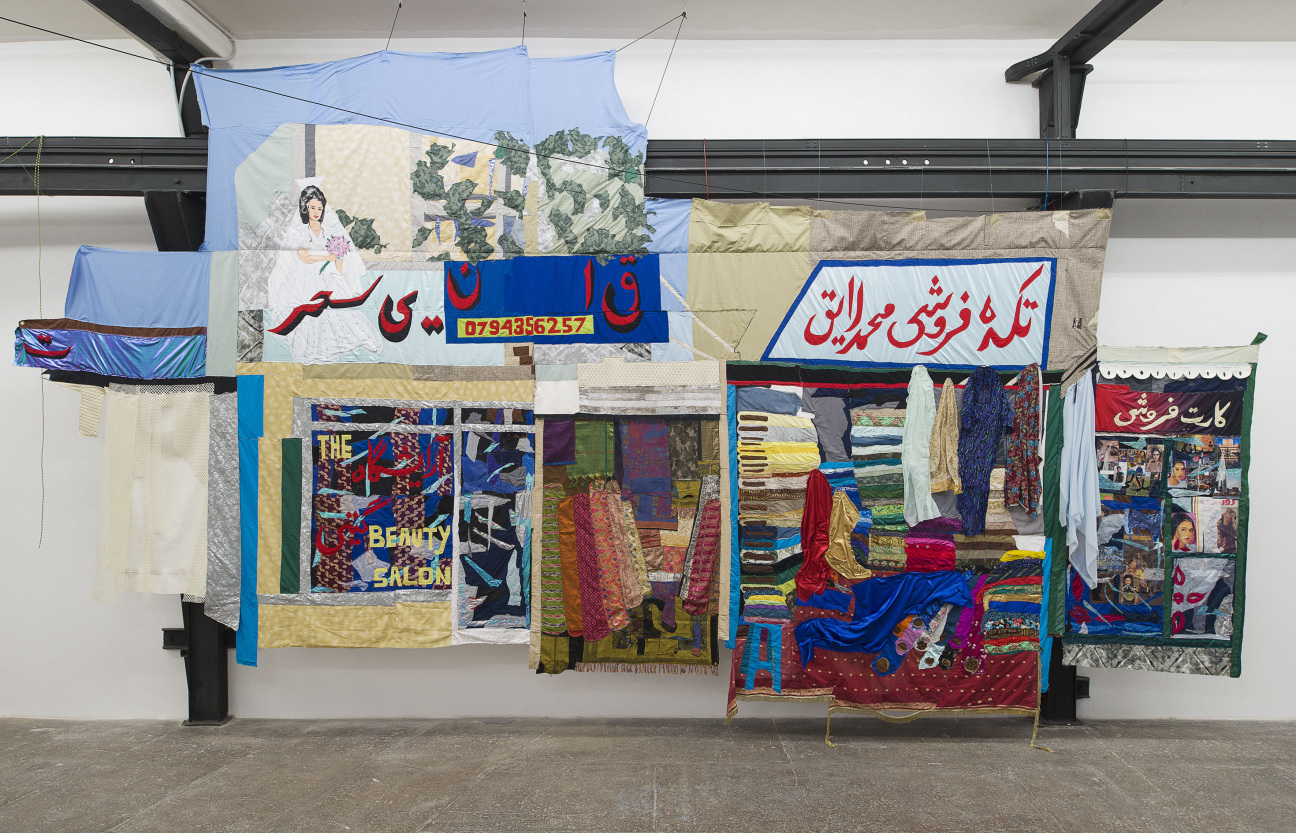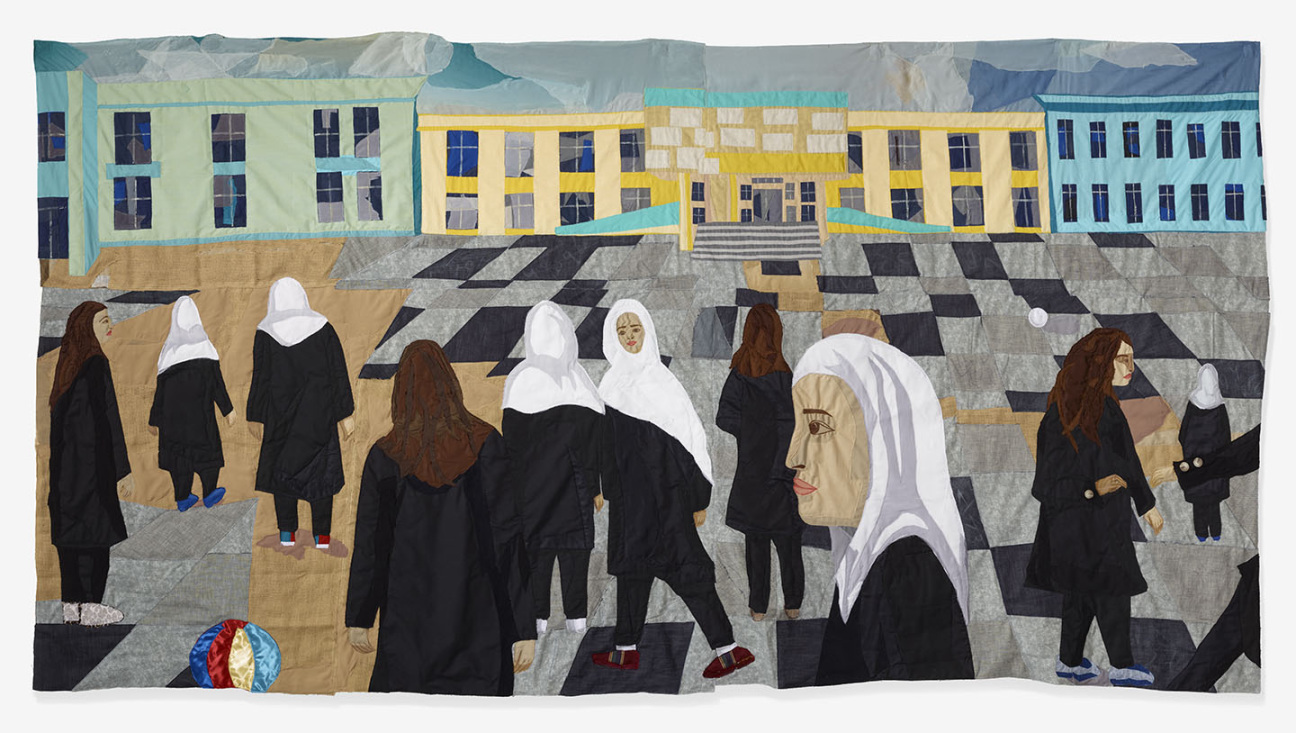
For Hangama Amiri’s first ever museum solo show, “A Homage to Home” at the Aldrich Contemporary Art Museum in Ridgefield, Connecticut, she explores the evolving definition of home. Reflecting on her own journey fleeing Afghanistan as a child, the artist reframes home as a concept in flux and one that is about the person more than the place. Her large, mixed-media textiles resemble a bazaar and transport the viewer to the vibrant streets that were bustling places of commerce and culture, scenes drastically different today under Taliban rule. Visually stunning and emotionally charged, “A Homage to Home” is a poignant reminder of the tenuous state of liberty, as well as a celebration of resistance.
Amiri was only seven when her family was forced to flee the Taliban in Kabul in 1996. They relocated to Central Asia before immigrating to Canada in 2005 and the U.S. in 2015. During this time, life in Afghanistan, in particular for women, changed radically. When the Taliban were overthrown in 2001, women suddenly became present in public spaces, and the material culture followed suit. Banners advertising women’s services, from salons to beauty products, proliferated. In 2021, the return of the Taliban brought a severe shift, stripping away rights and forcing women inside. The banners and businesses for women were defaced and shuttered. This devolution of her origins is at the heart of Amiri’s work.
“Home is less about the physical reality for a person or a community. It has more to do with feelings and memories that one chooses to carry,” Amiri says. “Since the Taliban seized Afghanistan in 2021, a fundamental question that keeps coming back to me is Where am I even from? Will this homeland be remembered, reconciled, or celebrated the way I remembered? Will I be a forgotten identity?”

Amiri hones in on changes under the Taliban by depicting women and exploring their roles in society. For women in Afghanistan today, home is both a form of self-expression and entrapment. Amiri shows her subjects in intimate domestic settings in quiet solitude. Images of women also appear on textiles resembling the now missing advertisements for beauty products. These representations of Afghan women show their resilience. Amiri’s subjects display many of the colors, materials, and attitudes suppressed and forbidden under the Taliban. “For me, women making a simple gesture to care for each other, flaunt their beauty, skin color, hair, or body are all forms of resistance against the long history of oppression and inequality,” she says.
Amiri honors the women in her own life and the legacy of creative, courageous women in Afghanistan. The materials themselves, often found, gifted from friends, and purchased from Afghan-owned businesses, hold meaning and represent the communities from which they are sourced. Using textiles connects Amiri with the women in her family who taught her to sew. Through all of these connections, Amiri celebrates home as a sense of community and culture of mutual care.

She also highlights the uncertain future for women under the Taliban. In Recess, 2022, a group of women stand outside a row of buildings in the distance. Resembling an assemblage of schools, the structures represent one of the rights now forbidden under Taliban law. Similar scenes showing women’s evolving place in society unfold throughout the show. Salons and bazaars once owned by and run for women are empty, their beauty products and vibrant goods remain untouched.
Despite the gravity of the subjects, Amiri weaves hope into her work. “There is strength in the women Hangama portrays and that is the joy to be found,” says exhibition curator Amy Smith-Stewart. “Hangama highlights the tenacity and ingenuity of women in Afghanistan and all over the planet who, despite the oppositions to their freedoms, continue to resist and defy the odds.”
As someone who went through trauma and displacement, Amiri’s story is one of hope and perseverance. “I have always been interested in shedding light on hope for the women of Afghanistan,” says Amiri. “I share stories so that others in similar situations can find consolation, solidarity, and aspiration. The message behind my work is that we shall rise again, again, and again.”
“A Homage to Home” is on view at The Aldrich Contemporary Art Museum from February 5 to June 11, 2023 at 258 Main Street, Ridgefield, Connecticut 06877.










 in your life?
in your life?

